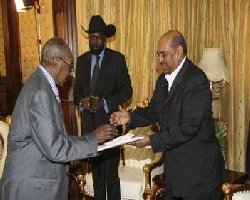South Sudan has officially voted to secede from the north after the results of a January referendum showed a landslide vote for independence.
Official figures released on Monday showed that 98.83 per cent of voters from the south chose to secede from the north.
The results, displayed at an announcement ceremony in Khartoum, revealed that out of 3,837,406 valid ballots cast, only 44,888 votes, or 1.17 per cent, favored the status quo of unity with the north.
The event in the Sudanese capital was attended by Omar al-Bashir, Sudan's president, and Salva Kiir, the southern leader.
His comments reflect the economic dependence between the two: southern Sudan, which is rich in oil, cannot export its oil resources without using a pipeline that runs through the north.
The January 9-15 vote came six years after north and south Sudan ended a civil war spanning more than two decades, which left at least two million people dead.
It has been seen as the climax of the 2005 peace deal, which set out to reunite the country and instill democracy.
A formal declaration of independence will be made on 9 July.
Uncertainties remain
Kiir welcomed al-Bashir's comments, saying he and the president's National Congress Party "deserve a reward".
Al-Bashir, who campaigned against secession, has surprised many commentators with a series of positive remarks about the south in recent weeks.
Ban Ki-Moon, the UN secretary-general, welcomed the referendum results.
According to his spokesman, Ban urged the governments in both Sudan and South Sudan to "build on the momentum generated by the successful conduct of the referendum to reach an agreement on post-referendum arrangements, including Abyei", the oil-rich region to which both sides lay claim.
Barack Obama, the US president, congratulated the people of Southern Sudan for a "successful" and "inspiring" referendum in a statement shortly after the results were announced.
In Juba, the southern capital, small celebrations have been taking place.
Future concerns
Despite the celebratory mood, Al Jazeera's Haru Mutasa, reporting from Juba, said uncertainties remain over the north and south's economic and political stability.
Sudan is almost entirely dependent on oil revenues and has struggled to find other sources of incomes.
PHOTO CAPTION
Southern Sudan Referendum Commission (SSRC) chairperson Mohamed Ibrahim Khalil (L) hands out the results of the referendum to Sudan's President Omar Hassan Al Bashir as first vice-president of Sudan and governor of Southern Sudan Salva Kiir (C) looks on at the presidential palace in Khartoum February 7, 2011.
Al-Jazeera


 Home
Home Discover Islam
Discover Islam Quran Recitations
Quran Recitations Lectures
Lectures
 Fatwa
Fatwa Articles
Articles Fiqh
Fiqh E-Books
E-Books Boys & Girls
Boys & Girls  Ramadan
Ramadan Fatwa Audios
Fatwa Audios Month of Mercy
Month of Mercy Women
Women Eed Al- Fitr
Eed Al- Fitr Food Recipes
Food Recipes Videos
Videos

 Prayer Times
Prayer Times












